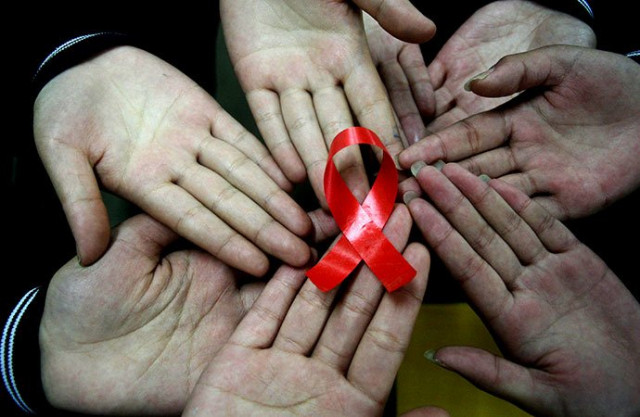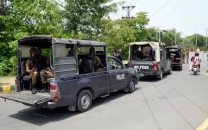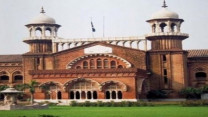Battling infection: AIDS patients urged to register for treatment
Patients at AIDS control facility say the treatment changed their lives.

PHOTO: AFP
“When I was diagnosed with AIDS three years ago, I thought my life was over. I didn’t think I had any treatment options and was afraid that my family would tire of taking care of me,” says Nazar Husain, an AIDS patient at a treatment centre run by the Punjab AIDS Control Programme.
“My family brought me to this centre and I am happy to say that my life is back to normal,” he says. “They say that there is no treatment for AIDS but approaching the right people gave me a new life.”
Husain is among 846 people being treated at the facility. Besides him, there are 600 men, 223 women, 22 children and a transgender, registered with the AID Control Programme in Dera Ghazi Khan.

“In December 2013, 470 people tested positive for HIV and registered for treatment,” says Dr Sadia Sheraz, the head of the AID Control Programme in the district. “By the end of 2014, the number had risen to 850.”
She says increasing number of HIV/AIDS patients coming forward for treatment did not necessarily mean that the disease was spreading.
“This means that awareness drives have been somewhat successful,” she says. “People have greater confidence in the AIDS Control Programme now that they have seen how we work and what we do.”
Sheraz says the clinic was set up in 2006. The treatment and medicines here are free. She says medicines worth Rs80,000 are given to each patient in a month.
She says tests for HIV are also free and are done in complete privacy.
According to estimates of Tender Hearts - an NGO working on HIV/AIDS awareness in south Punjab - there nearly are 6,000 people suffering from the disease in Dera Ghazi Khan of which 70 are in Rakni, Kohlu and Barkhan tribal areas.
Sheraz says the government is also planning to set up a treatment centre in Multan.
Voluntary Counselling and Testing (VCT) In Charge Syed Ali Asghar Gardezi says many people who came to the centre had been deported from Middle Eastern countries where they had been working. He says counselling and treatment are kept confidential.
“The course of the treatment is between the doctor and his patient,” he says. “The test itself takes 10-15 minutes. The results are not disclosed to anyone but the patient.” He says even families of the patients too are not given information about the patients without their consent.
Gardezi said the clinic is working with several NGOs.
“They encourage people to visit the clinic and meet with us,” he said.
He says besides HIV/AIDS, 22 patients of tuberculosis, 82 patients of hepatitis C and 13 of hepatitis B were also being treated at the centre.
Faryal Hameed, another patient at the centre, says all unregistered patients should be urged to come forward and get treated.
“I have been undergoing treatment for two years,” she said. “Despite my fears, I have even given birth to a healthy baby.”
“We have to trust the treatment,” she said. “It’s our only hope.”
Published in The Express Tribune, January 26th, 2015.



















COMMENTS
Comments are moderated and generally will be posted if they are on-topic and not abusive.
For more information, please see our Comments FAQ